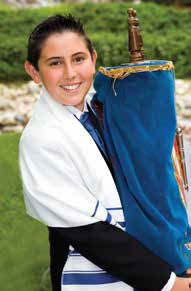13 Steps in Bar and Bat Mitzvah Planning
07 Jul, 2014

Reaching the age of B'nai Mitzvah signifies becoming a full-fledged member of the Jewish community with the responsibilities that come with it. Bar and bat mitzvah festivities typically include a celebratory meal with family, friends, and members of the community. The main idea behind b'nai mitzvah according to the Orthodox view is that the celebrated child is so happy to do a mitzvah and earn a reward in the next world for their efforts, that they throw a party and have a festive meal.
B'nai Mitzvah parties in America are often lavish affairs held at hotels and country clubs with hundreds of guests in attendance. This article illustrates 13 significant steps that a family should consider when planning this important event.
1. Selecting a date
The first step in planning a child’s bar/bat mitzvah is deciding on a date. It is crucial to contact the synagogue as children are required to complete a certain number of hours in religious or Jewish day school before the celebration. Most often, parents contact their synagogue up to 3 years before their child’s bar/bat mitzvah to learn about the program and set a date for their transition into adulthood. Depending on the size of one’s synagogue, a date may be assigned to you or you may choose your own. Oftentimes, small synagogues are flexible and allow you to select your own date, whereas larger synagogues may assign a date.
It is best to hold the event as close to the child’s birthday as possible. Also, when selecting a date, try to avoid holding the event on a holiday weekend, during the same time as any community gatherings, or when you know there is another child having their bar/bat mitzvah.
2. Setting a budget
When setting a budget, create a spreadsheet of all expenses that may incur when planning for the day. Consider the service at the synagogue, the pre-service dinner for family and out-of-town guests, and the celebration after the service (including entertainment, food, beverages, décor, etc.) In order to know what some of these items cost, it is best to request quotes from your preferred vendors. This way you will have a general idea of what to expect to pay.
3. Booking a venue for the reception after the service
Once you have a date and budget set, it is best to begin searching for a venue. Popular venues book up more than a year in advance so it is important to begin this search early, especially if you can only book the event on one specific date. When looking for venues, check out locations that your son or daughter’s friends may have already utilized. Often these venues have kid-friendly menus and may be a resource for party planning ideas if they do them often. If you are on a tighter budget, consider hosting the celebration in the early afternoon vs. the evening. Many venues require you to spend less money for a daytime event and may be flexible on the menu pricing for lunch. When booking a venue, you will need to sign a contract and place a deposit down for the date. Check with the venue for payment options and what their payment schedule is. Also, when looking for a venue, make sure it is not far from the synagogue so guests do not spend too much time traveling.
4. Tutoring
Some bar/bat mitzvah programs require up to four years of Hebrew school and Torah school. As the bar/bat mitzvah date grows closer, children participate in group classes to learn the meaning of prayers and the blessings of Shabbat. During their ceremony, a child is required to chant the blessings and prayers for their family and friends. About 8 months before the celebration, tutoring may include working on the translation of the Torah and smoothing out the Hebrew readings and blessings. Tutoring is imperative because on their bar/bat mitzvah the child should feel comfortable and confident in front of the audience.
5. Choosing a Tzedakah project
Many synagogues require that the child participate in a Tzedakah project. According to the Torah, one is commanded to do 613 good deeds. Finding a Tzedakah project is a good way to enhance the meaning and relevance of a child’s Bar/Bat Mitzvah. The importance of this project is not to give charity out of kindness, but instead to seek a just world. Some examples of a Tzedakah project include working with local charities to assist with clean up in your community or helping those in need at homeless shelters.
6. Book your vendors
Now that a venue has been booked, it is imperative to begin selecting the vendors who will assist in bringing together the celebration. Vendors include a DJ or band, photographer, videographer, entertainers, and caterer (if your venue does not provide the food and beverage). Remember: It is important to select a DJ or band who can entertain both kids and adults.
7. Set the theme and pick out décor
Think about the interests of the soon-to-be young adult. Are they into sports, comics, video games, animals, or nature? What is their favorite color? Obviously their interests may not be what their parents have in mind, but it is important to make sure that the décor expresses their interests. Speak with an event designer or florist for additional ideas. You can also gather ideas from Pinterest.
8. Finalize the guest list
You will want to invite all of your friends and relatives to the celebration. Start with your b'nai mitzvah guest wish list. This is the fun part. Just write down everyone you can think of and then begin to trim it down until you have a number that works for both your budget and your b'nai mitzvah venue. If you really want to add a couple more guests, relax, think, breathe, and do what makes you happy.
9. Decide on the menu
Is kosher catering needed? If the venue you have selected does not offer kosher meals, you may need to look into a kosher caterer to provide special meals for kosher guests. Otherwise remember that you will have a large amount of young teens and adults attending the event. Ask your venue if they have a special menu geared towards the taste buds of your guests. Serving the kids from a buffet is the simplest option. Some guests may be picky eaters, so choosing a buffet option will allow them to pick and choose what they want to eat. Generally, it is more elegant to offer a plated meal for your adult guests. This way they do not have stand in line and can have the pleasure of relaxing at their tables and being waited on.
10. Writing and sending out invitations
The style and color of invitations do not need to follow special rules. However, it is important that the invitations carry over the theme of the event which will also set expectations for your guests. There are many websites that can assist you with how to properly word the invitation text. Simply searching the Internet for, “How to write a Bar and Bat Mitzvah invitation” will give you many resources. Your invitation should include a reply card with a self-addressed envelope. It is best to send your invitations out eight weeks prior to the event and to have your guests return their response at least a month in advance so you are not waiting on their response at the last hour. The reply card should also include meal options if you are offering different entrée selections or will require special meals such as kosher or vegetarian.
11. Plan the Candle Lighting Ceremony
This tradition normally takes place once the meal has been served or after guests have gone through the buffet. Long tapered candles are used to recognize close family and friends. Those selected are called up to light a candle while the young adult says a few words signifying the importance of their relationship.
12. Prepare a speech
It is common that the one celebrating their B'nai Mitzvah should prepare a speech. It is important that the speech contain ideas from the Torah and emphasize the young person’s commitment to Jewish values. It is also important that the young person thank their family for their support throughout their time in Hebrew school. It is also customary for the parents to say a few words. Typically family and friends are thanked and the son or daughter is praised and congratulated for his/her transition into adulthood.
13. Have fun!
After all the preparations and study, remember to relax and enjoy the festivities with family and friends!
Category:






